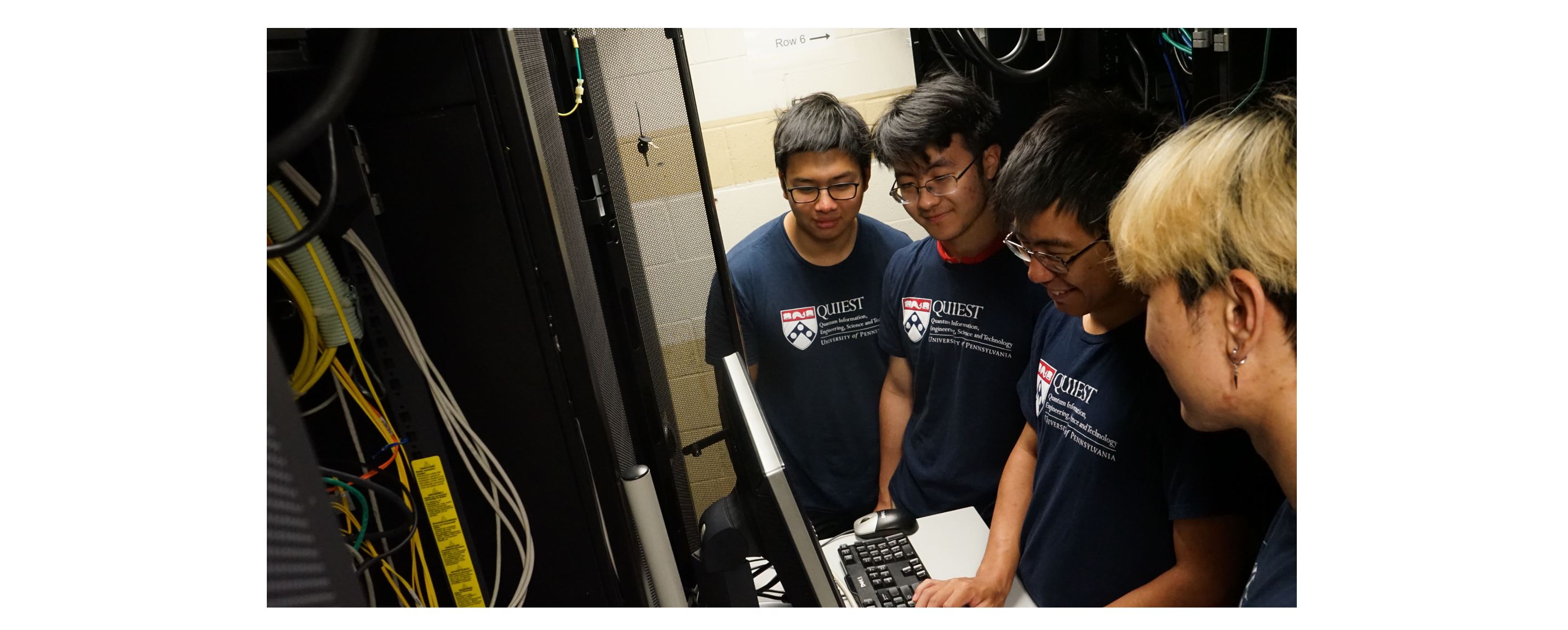
Jonathan Hong and Kevin Yao conducted research on quantum computing with mentorship from Dr. Gushu Li (Department of Computer and Information Science), and this research was supported by the Penn Undergraduate Research Mentoring Program (PURM).
Jonathan Hong ('26) is a Computer Science major. Read more about his research experience below!
This summer, I worked on optimizing Fermion-to-Qubit mappings for quantum computers. These mappings are the mechanisms by which physical particles can be converted into quantum circuits. I was intrigued by this research project due to its novelty (as I personally had not found the chance to explore quantum computing on my own), as well as its applicability to complex physics and chemistry simulations, which I have always found fascinating.
Throughout the experience, I not only learned about the technical aspects of qubit mappings in quantum computing, including some examples of existing Fermion-to-Qubit transformations, but I realized how vast the field of quantum computing is. The papers I was reading were filled with concepts and terms that were unfamiliar to me. I realized that I couldn't possibly chase down every single idea and understand them in their entirety in just one summer, so I needed to learn how to discern what was the most relevant information for my specific summer project and leave the ancillary topics to a later time.
Of course, the research experience was also made much more manageable by having quick communication lines set up with peers and our research supervisor. Regular group meetings helped us stay focused on weekly objectives and new ideas to ponder. Sharing ideas and asking questions with a peer on a day-to-day basis proved to be extremely helpful, especially when faced with difficult concepts to grasp. Being able to hear another explanation or perspective about a technical idea vastly improved my understanding and learning of the topics encountered.
Overall, I would say that one of the most important skills I’ve developed was the ability to learn on my own, particularly with regards to interpreting and deciphering content in academia. Oftentimes, authors would not delve deeply into the foundations of what I was investigating – as such, the onus fell upon me to explore and teach myself the background information I lacked. Learning to navigate the complexities of quantum computing not only deepened my technical understanding but also honed my ability to independently decipher and accrue new knowledge.
Kevin Yao ('27) is a Computer Engineering major. Read more about his research experience below!
My research focused on mapping fermionic systems to quantum computers. Fermions are particles like protons, neutrons, and electrons. The most fundamental parts of our universe -- atoms and molecules -- are fermionic systems. These systems are very important to study, but as the number of fermions increases, the complexity of a system increases exponentially, resulting in classical computers not being able to do these simulations. However, quantum computers, using quantum bits, are able to keep up with this exponential complexity. My research focused on mapping actions in a fermionic system to operations on a quantum computer, optimizing to reduce the complexity of the circuit when run on a quantum computer.
I chose this project because I wanted to work with and learn about quantum computers, a promising new technology. Specifically, I was drawn to this project because it works on a real world application of quantum computing, which is often seen as a gimmicky new technology that only works in theory. Being able to simulate fermionic systems would allow researchers to study elements and molecules in ways they never could before, allowing for advancements in physics and chemistry. Through this work, I learned about the physics of fermionic systems, and the importance of innovation and perseverance in solving complex problems.
The most challenging part of the experience was going into a relatively new topic with only a vague research question for direction. I responded by breaking down the problem into smaller, manageable tasks, conducting broad exploratory research (through reading papers and talking to my mentor during meetings) to refine my understanding, and gradually narrowing down my question as I gathered more information. This approach allowed me to build confidence in my ability to navigate unfamiliar territory and develop critical problem-solving skills. As a result, I have grown more adaptable and resourceful and feel better prepared to explore topics I am not very familiar with.
Over the course of the PURM program, I’ve improved my ability to think critically and solve problems, especially problems that do not have clear solutions. I plan to use these skills in my academic and professional pursuits, particularly in projects that require innovative approaches. Additionally, I have improved my ability to gather relevant information from documents, whether academic papers or technical code documentation. This will help me whenever I encounter new problems, as I will be able to get a grasp of them much more quickly.
Interested in reading more first-hand accounts about undergraduate research? Check out the other experiences featured on our Student News Page and Social Media!
Related Articles
Discovering the Path of a Physician-Scientist
Jacob Cao (‘26), a Biology and Nutrition Science double major, investigated the influence of dietary sugars on the gut microbiome with mentorship from Dr. Aaron Hecht (now at the Mayo Clinic) and Dr. Gary Wu (Department of Gastroenterology). This research was supported by a College Alumni Society Undergraduate Research Grant.Developing Hope in the Age of AI
Avia Weber (‘26), an International Relations and Psychology double major, studied the impact of artificial intelligence development programs led by the U.S. and China with mentorship from Dr. Valeriya Kamenova (Department of International Relations). This research was supported by the CURF Summer Research Funding Grant.